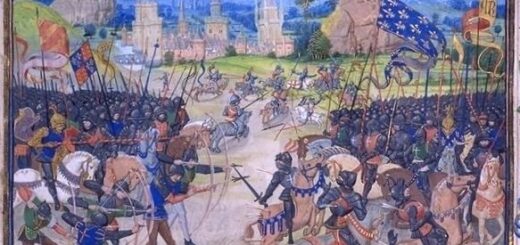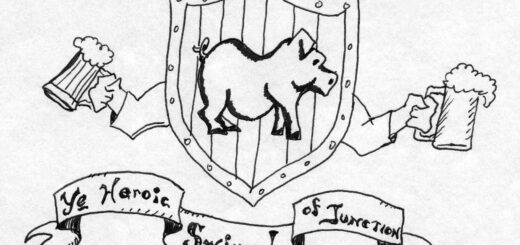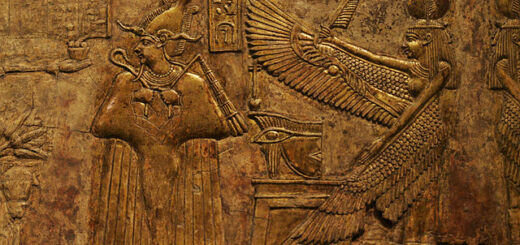The Tragic Flaw: Pride
Sin number one is Pride–a big one that really sets us up for a fall. There are several ways for this ugly trait to raise its head.
1. Competing with the PlayersPerhaps the most common variety involves the natural competitive edge we all feel from time to time. Sometimes a referee views the game as a kind of competition between himself or herself and the players. (For more about an even darker version of this rivalry see the upcoming installment on Wrath.) It can be hard for some people to break away from the concept that a game is a type of competition that someone can win. Gamemasters who fall into this particular trap tend to feel the need to compete with the players and keep them in their place. Usually, in its more banal form, this particular manifestation of the sin takes the form of having officials, higher ups, and mentors constantly put the party down or show them up. The prideful DM take pleasure in seeing the PCs butt up against obstacles that they cannot overcome except through the kindly intercession of the gamemaster’s benevolence. You know this type of game and gamemaster by the constant presence of annoying town guards who block even the most simple actions, by the presence of villains who cannot be brought low no matter how clever or resourceful the players are and who always manage to outwit or at least escape the players, and by the occasional outbursts from the players who become fed up with it and finally confront the gamemaster and threaten to wreck the whole enterprise unless the gamemaster backs down. The gamemaster controls the world and everyone in it but the player characters, and even those can be pushed around at whim – at least until they rebel, so the contest is never even, fair or interesting. In fact, it can never be a contest at all, just as a role playing game cannot be won (though I’ve also met players who will reject that truism!).
So the gamemaster must think of himself or herself as a facilitator and perhaps even a collaborator rather than an adversary. It’s an obvious and simple fix, but it is surprisingly hard for some people, even some very smart people, to embody this truth in their games.This is fortunately a fairly obvious and easily rectified problem. The simple truth is that admitting the problem exists or coming to realize that this mindset has been adopted cures the condition almost immediately. All one has to do is “get it” and the cure is dispensed.
The only trouble with this, and also most insidious feature of the sin of Pride, is that gamemastering is inherently an act of Pride. When one sits behind the screen, he or she is effectively taking the role of god (little “g” here as it’s probably polytheistic). That’s not a problem (at least for the game) when that Pride leads the gamemaster to spend hours perfecting the next adventure or developing potions of the game world. It is a problem when the gamemaster forgets that this world only has an external existence, a purpose, in the negotiated play that is made possible only by players willing to visit that world.
2. Determined to Win an ENnie for this Scene
The more insidious form of gamemastering Pride occurs when the referee blurs the line between challenge and frustration in an overzealous (but totally understandable!) attempt to make the game memorable.
As gamemasters we all want our games to be remembered, to live on in bragging rights and to be recounted years from now over a slow game of Magic or around the BBQ when the mundanes are out of earshot.
We also know that what people remember is the most challenging moment, the point in the game where the crisis came to a head and despite terrible odds, the party triumphed.
What we sometimes forget is that the party has to believe in their ability to succeed in order to make it through such challenges.
Our Pride — and the always increasing power curve of the players — leads us to create ever more difficult problems for our players to solve. It is not enough for it to be a challenge. Our scenario must pit the players against an array of dangers so overwhelming and diabolically clever that the players will only succeed through amazing good fortune.
It is necessary to create such tension; but one can go too far. When it becomes a matter of Pride, we tend to make our villains so appallingly competent, our traps so devious, our NPCs so annoying that the players give up. They shift from challenged to frustrated and they stop trying. Every encounter doesn’t have to be a fiendishly clever death trap, and each new monster doesn’t have to boggle the imagination and terrify the players into convulsions of inadequacy and despair.
Relax a little and let your players be the competent, intelligent lucky heroes they enjoy playing. Most of us get plenty of despair and frustration from considering our career prospects or social lives; we don’t need it in our games. Leave angst and despair to the Vampire: The Masquerade gamers.
3. Policeman of Player Pride, Destroyer of Dreams
Reflecting on this point, let me indulge in one last rumination on Pride: Your players have it too — let them keep it. In the worst expressions of the gamemastering sin, the game becomes more about the gamemaster’s ability to humble and belittle the characters or, even more destructively, the players.
As I previously mentioned, we all want to be heroes. It is your job as a gamemaster to challenge the players so that they feel worthy of the title. But it is also your responsibility to allow the players to feel special when they do rise up to those challenges.
The worst mistake I commonly see inexperienced gamemasters make is that of embarrassing their players. Having random NPCs question a character’s manhood or humiliate them in an insult contest is not good for the PC ego.
It is not a challenge to humiliate a character; you control the world after all. It is a challenge to your skill as a gamemaster to build up the players’ image of their characters (and to some degree themselves) by confronting them with difficult tasks at which they can truly shine and reveal themselves as competent heroes. Now that’s something to take pride in. †












